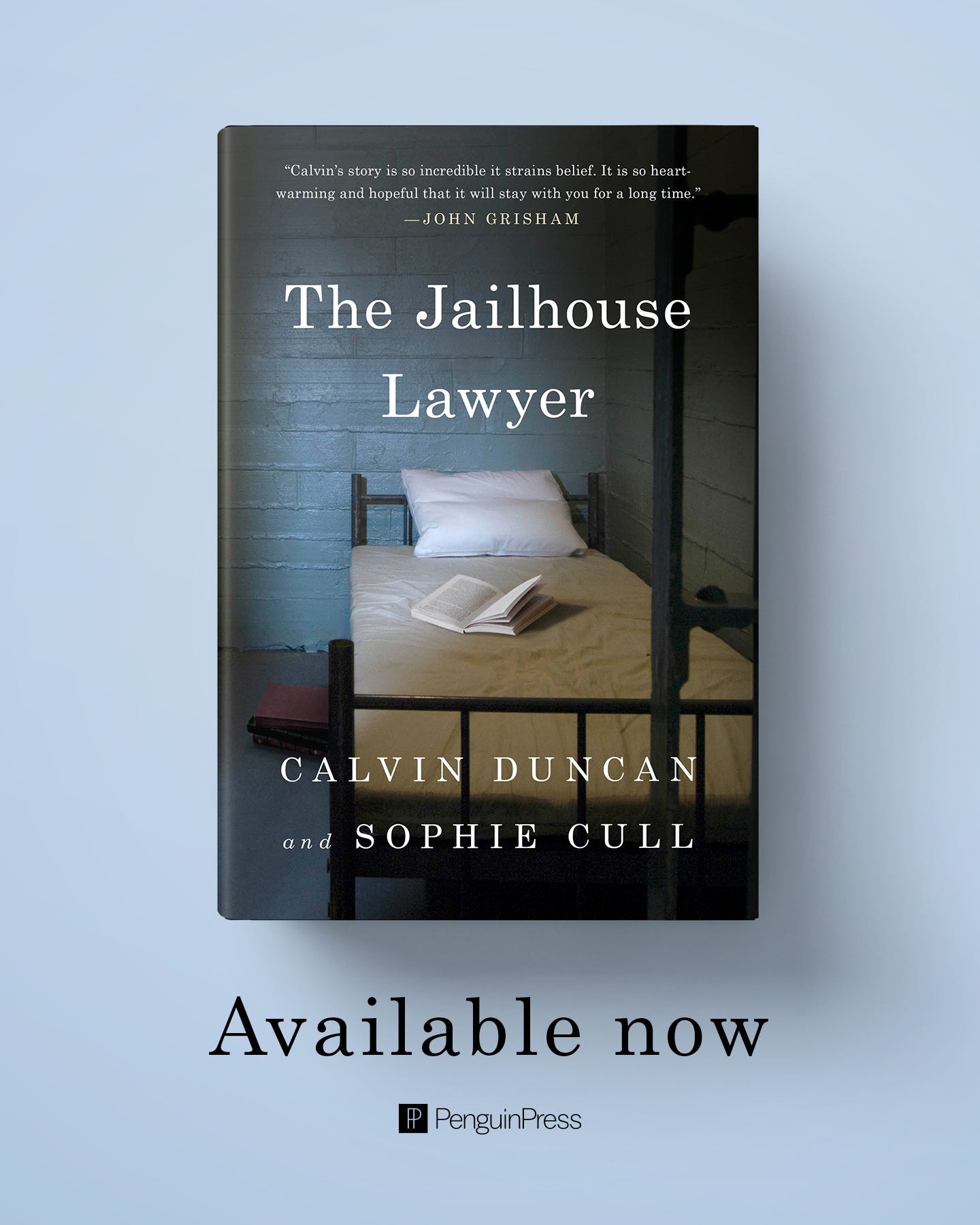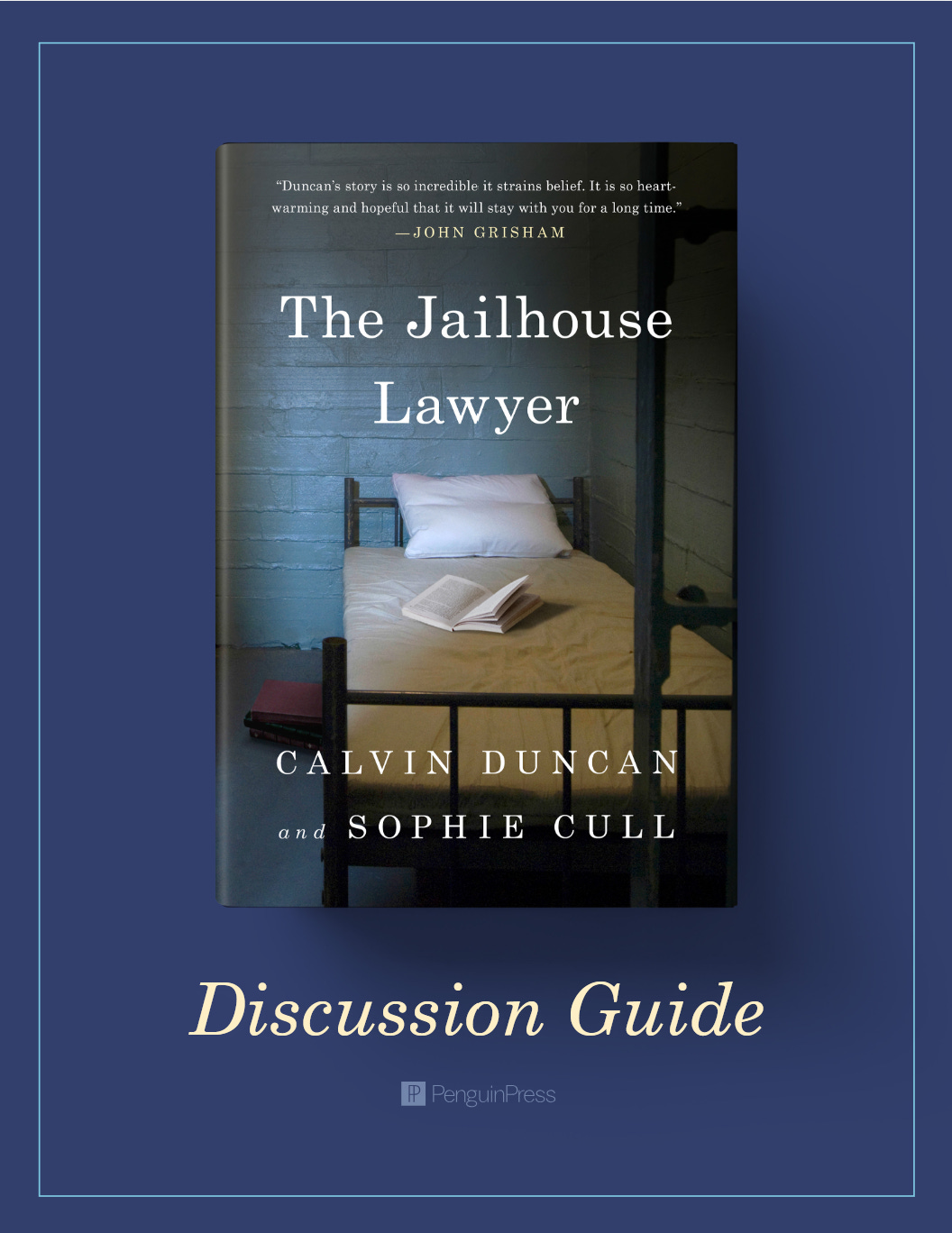The Jailhouse Lawyer
On July 8, Penguin Press published The Jailhouse Lawyer, my book written with my friend Sophie Cull about my career as a jailhouse lawyer.
It tells the story of how I went from facing the death penalty in Orleans Parish Prison to becoming a self-taught “counsel substitute” at Angola, thanks to the mentors, books, and friendships that shaped me. It explores the cases I worked on, the obstacles I faced, and the fight for justice inside a system designed to keep poor people out of the courts.
This story is the culmination of a three-decade journey through Louisiana prisons and over a decade of work since I’ve come home, and I am really excited to share it with you.
Thanks for being part of this journey with me. You can order the book at any of the sites below or your favorite local bookstore.
Links to purchase The Jailhouse Lawyer:
Porchlight (discounts for bulk orders)
Discussion Guide
For those of you reading the book in classes or book clubs or study groups, please download the official discussion guide.
PRAISE for The Jailhouse Lawyer
I was honored and so happy when some of my heroes read my story. I’ve shared their words below, along with some early reviews from trade publications:
John Grisham
“If I created a fictional character like Calvin Duncan, no one would believe him and the story wouldn’t work. Fiction can be many things, but it has to be believable. Duncan’s story is so incredible it strains belief. It is so heartwarming and hopeful that it will stay with you for a long time.”
James Forman, Jr.
“The legal system tried to destroy Calvin Duncan. But rather than submit, he used the law to fight back, both for himself and for hundreds of other incarcerated men. This brilliantly told story—at once maddening and miraculous—is among the most powerful indictments of our criminal justice system I’ve ever read.”
Adam Haslett
“The truth is a powerful force, but without advocates, it dies. And Calvin Duncan is an advocate for the truth unlike any you’ve ever encountered—not simply on his own behalf but for hundreds of others caught up in the unending disaster of our American gulag. The book he and Sophie Cull have written with such precision and vividness and heart is a testament to that advocacy which no judge or court can deny. Read it and weep. Books that change the way you see the world are few and far between. The Jailhouse Lawyer is one of them.”
Sr. Helen Prejean
“Calvin Duncan is surely the most extraordinary jailhouse lawyer of our time. The Jailhouse Lawyer offers an intimate portrayal of Duncan’s decades-long journey for justice, fighting for thousands of indigent prisoners against a merciless legal system. This remarkable debut is both a powerful account of Duncan’s struggle and a clarion call to end the brutal legacy of mass incarceration. Duncan’s relentless determination to champion those forgotten by justice will ignite a fire within you that will burn long after you’ve finished the book.”
Dwayne Betts
“Where most prison memoirs are haunted by prison, this is a book that troubles you with what it means to relentlessly pursue freedom. It’s not simply that Duncan is to be respected, it’s that he is a singular example of what it means to have an indomitable will. Reading this book is a revelation.”
Jim McCloskey
“A superbly written, compelling memoir chronicling Calvin Duncan’s remarkable life—an innocent man incarcerated at the infamous Angola State Prison who became a self-taught, brilliant jailhouse lawyer. Although the word ‘hero’ is greatly overused in today’s society, in my mind, Calvin Duncan is a hero in the truest sense of that word. I urge all who are in need of inspiration to please read this riveting account of an indomitable spirit in the face of ongoing stiff resistance.”
Trade Reviews
Kirkus
Wrongfully arrested and convicted of murder in New Orleans, which at the time had “the highest rate of wrongful convictions in the nation, with nearly all the victims being Black men who…grew up poor,” Duncan served for 23 years in Louisiana’s notorious Angola prison and other institutions. He might have done his time at the Orleans Parish Prison, but, he writes, he wanted access to Angola’s more extensive law library. Well before being transferred there, he petitioned the Louisiana Supreme Court for a law book, a motion denied because it had not first been adjudicated in a lower court. A sympathetic judge gave him a copy all the same, and Duncan was off to a career as an inmate advocate, regularly filing petitions and lawsuits on his own behalf and that of his fellow prisoners—the first suit being “over the jail’s failure to provide him with a high-fiber diet,” soon followed by motions to provide mental health treatment, end beatings and arbitrary punishments, and improve medical care. Known as the “Snickers Lawyer” for taking payment in candy, he became a self-taught expert on constitutional issues. Naturally, he recounts, he was targeted by guards and wardens for his legal activism, even as he proved essential to Angola’s population; in time, too, he found a few unlikely allies among the staff. Duncan’s well-told story is full of fraught moments of abuse both physical and judicial, though it has something of a happy ending in that, after earning a law degree after his release, he was exonerated of the crime and has since been fighting for other prisoners to “have meaningful access to the courts.”
An eye-opening look at prison life from the point of view of a true warrior for justice.
Booklist (Star review)
If Duncan’s life story were a movie, there would be many points where it would reach a crescendo of vindication. It is in those times, when often minor or grotesquely bureaucratic details bear him back to the circumstances of his past, that The Jailhouse Lawyer will stagger readers at both Duncan’s resilience and the deep flaws of the legal system. In 1982, Duncan left his hometown of New Orleans for a Job Corps station in Mount Hood, Oregon. But, as Duncan puts it, New Orleans “had a way of ruining things.” New Orleans police had tracked Duncan down for a murder that had taken place before he left the city. A shaky eyewitness testimony led to a quick conviction. This is followed by decades of navigating the serpentine legal system, advocating for himself and others as a jailhouse lawyer, and crafting motions and studying case law from inside Angola’s law library. While The Jailhouse Lawyer, written with coauthor Sophie Cull, is told from a third-person perspective, Duncan’s distinctive voice shines through. The inmates he helps along the way showcase that, though Duncan’s story may be remarkable, it is sadly not unique. Readers will come away changed—angry, heartened, and galvanized.
— Jeff Connelly



